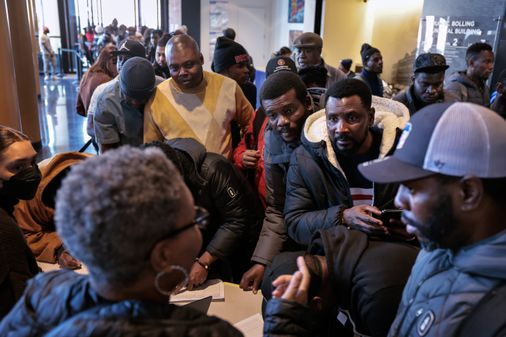Her excitement proved short-lived. Charles, who for years worked service and manufacturing jobs in Venezuela and Brazil after leaving Haiti, said she has spent months applying for jobs in retail stockrooms and back-of-house positions at chain restaurants. Charles speaks Haitian Creole, Spanish, and Portuguese, but not English, and she lacks reliable transportation from Stoughton, where she lives at a Hampton Inn repurposed into a temporary state shelter for migrants.
Weeks after arriving here, the Haitian immigrant finally received the document she had been waiting for: a federal permit authorizing her to work in the country by the Department of Homeland Security — a ticket to employment, to independence, she thought.
STOUGHTON — During her first year in the United States, Marie Altagrace Charles struggled to support her family, forbidden from earning a paycheck in the country she spent months trying to reach. She and her family spent 11 months in Florida, but poor support systems prompted them to move to Massachusetts in November.
“Several jobs have called me back, but when they call me, they speak in English,” Charles, 51, said in Haitian Creole. “I just want to work. As long as I find a job, I’ll take it.”
Advertisement
State officials, including Governor Maura Healey, have touted work authorization as a key step to help new migrants move out of the state’s overcrowded emergency shelter system and build a life here. Those authorizations are even more urgently needed after Healey on Monday announced a new rule requiring shelter residents, in part, to prove they are searching for employment. But Charles and other migrants who spoke with the Globe said they’ve struggled to land work even after receiving authorization because of language barriers, a lack of transportation and other factors, signaling their transition into the state’s workforce might take more time than officials would like.
Advertisement
“An [Employment Authorization Document] is not an automatic ticket to a job,” said Jeff Thielman, president of the International Institute of New England, which offers legal and social services to newly arrived migrants in Greater Boston. “It is not a linear path. You don’t move from EAD to a job without a lot of steps in between.”
Securing a work permit can be a lengthy process. Those seeking asylum status can apply for work authorization only after their asylum application has been pending for 180 days, according to US Citizenship and Immigration, and applications can take around one month to process. In rare cases, according to a representative of the state Office of Refugees and Immigrations, it could take up to year, depending on how the person entered the country.
A group of Haitian migrants wait in line to apply for employment opportunities at Goodwill Industries during a resource and job fair in Roxbury. Though some migrants see work authorization as a ticket to employment, the job search can take months. Craig F. Walker/Globe Staff
After that, Thielman said many migrants often need additional support, including English classes, soft-skills training including communication, and orientation into the United States job market.
“There just aren’t enough structures in place or systems in place to actually give people English skills, and to help them go through the process of actually applying for a job,” Thielman said.
The state offers some soft skills training and vocational English classes designed to rapidly give English-learners a partial vocabulary tailored to a specific industry at its network of MassHIRE Career Centers, which offer full services to migrants with work authorization.
But with 7,500 families in shelters and hundreds more on the waiting list, it can be difficult to keep up with demand for skills training and English classes.
Advertisement
According to the state’s latest bi-weekly Emergency Assistance report, more than 2,700 migrants in Massachusetts shelters have authorization to work, and that number has not changed since December. The state does not have a complete and current count of those in its emergency sites who have work authorizations, according to Valentina Amaro, a spokesperson for the Governor’s Office. She said more than 3,400 new applications have been filed in the past six months.
The state expects “the vast majority of those have already been granted,” Amaro said in a statement Tuesday.
Destin Mathurin received his work permit in Florida in March 2023, and moved to Massachusetts with his pregnant wife and three children several months ago. Mathurin, who does not speak English, has worked in restaurants and as a landscaper, and while he would prefer a job he is familiar with, the 50-year-old said he would take anything at this point.
“I haven’t gotten any callbacks,” Mathurin said in Haitian Creole. “I don’t know what the problem is, because I have my work authorization.”
Beth Goguen, director of central programs for the MassHIRE Department of Career Services, said some migrants “may not realize how much of a barrier” the language gap can be. She said her agency has focused heavily on English lessons in recent months.
Earlier in March, Goguen’s office hosted a job application fair specifically aimed at Haitian migrants, which she said drew more than 400 people with work authorization and another 120 who did not yet have theirs. Fifteen employers attended, including Ascentria Care Alliance, Literacy Volunteers of Central MA, and Friendly House, according to Matthew Kitsos, a spokesperson for the Executive Office of Labor and Workforce Development. It’s not clear how many people secured jobs at the fair.
Advertisement
“It’s hard to paint this broad stroke on why it takes somebody longer to find a job,” Goguen said. “There’s no easy answer.”
Dunois Labisiere, another Haitian migrant staying at the Stoughton shelter, said he received his work authorization after attending an application clinic in Reading in November. Nearly 2,000 migrants filed applications at that clinic.
His authorization came within one month and he spent three more months looking for work. Ultimately, a friend and fellow immigrant helped Labisiere get a job at a Costco in Dedham.
“I got the work authorization in just one week,” Labisiere said in Haitian Creole. “My biggest problem was finding a job.”
The 42-year-old started work last week, stocking merchandize and performing various manual tasks for the retailer. While he was happy to have a job and to be able to provide for his wife and two children, he said the distance between the store and the shelter in Stoughton requires him to take an Uber, which can cost up to $24 each way. Labisiere said he makes $18 an hour, but does not yet have a consistent schedule.
Resettlement officials and advocates, including Thielman and Goguen, said transportation remains an issue for many migrants who have found a job but remain in a shelter.
Advertisement
“You don’t want someone to get a job … and then be moved to Waltham, or Springfield, or Barre, Massachusetts,” said Mandy Townsend, senior vice president of employer engagement at Jewish Vocational Services, which runs a MassHIRE career center in downtown Boston.
The challenge of helping people find work has been made more challenging by the placement of migrants farther and farther from the Boston area as the stock of affordable space dwindles, she said.
Jewish Vocational Services held a job fair targeting non-Native English speakers Monday with four Boston-area food service companies. About 100 people — mostly Haitian Creole speakers — showed up looking for employment.
Buckey said the organization plans to hold more job fairs moving forward.
“The employers were just so overwhelmed and enthusiastic about the number of people who were there, and the prospect of being able to fill so many positions,” Buckey said. “The big wait at this moment in time is to see how many people do get hired, but we’re very optimistic.”
Daniel Kool can be reached at daniel.kool@globe.com. Follow him @dekool01.



